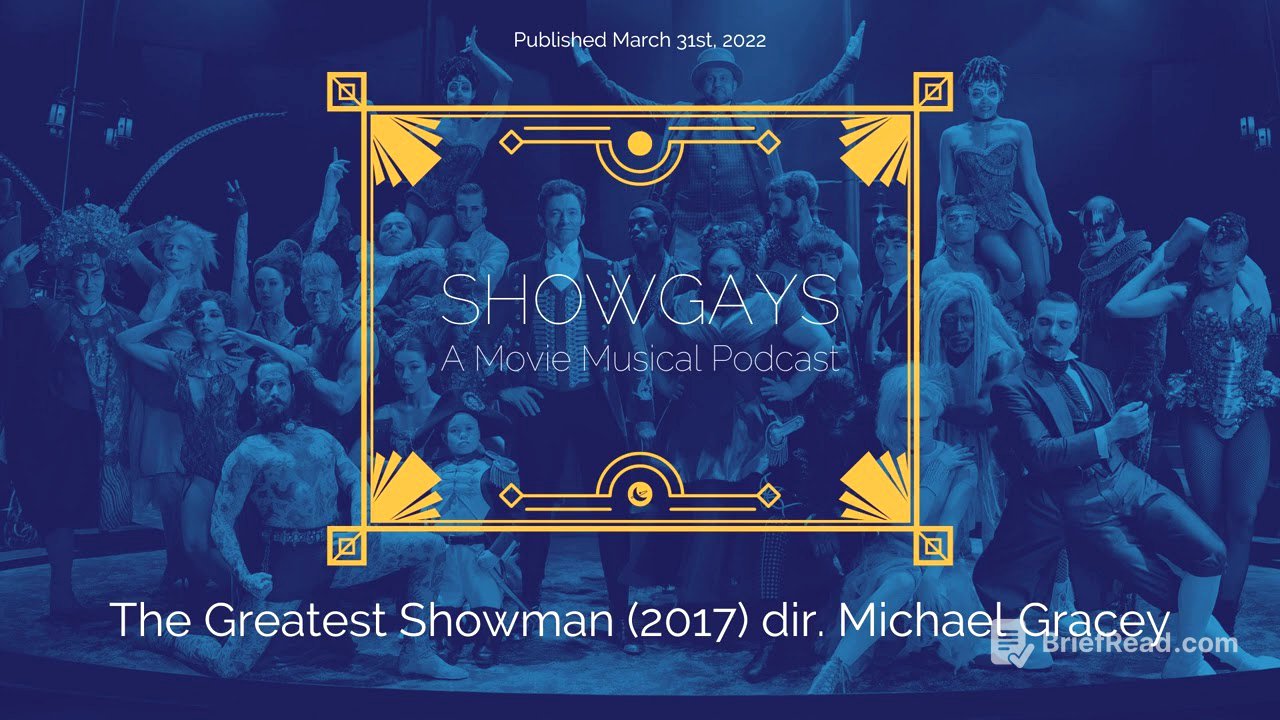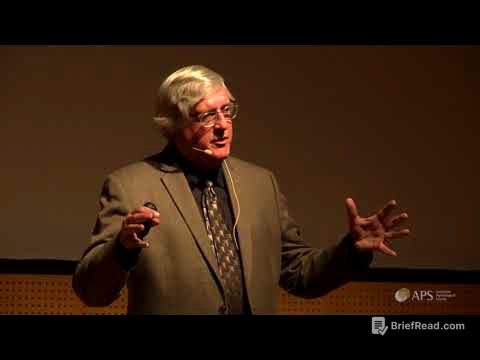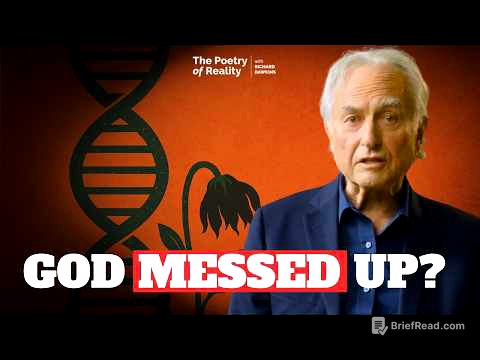TLDR;
The Ampliverse discusses the 2017 musical film "The Greatest Showman," exploring its historical inaccuracies, problematic themes, and overall artistic merit. The hosts share their personal experiences watching the movie, critique its portrayal of disability and race, and examine the real-life figure of P.T. Barnum. They also discuss the film's music, direction, and screenplay, ultimately questioning its message and impact.
- The film sanitizes the problematic history of P.T. Barnum, particularly his exploitation of marginalized individuals.
- The movie fails to meaningfully address themes of disability, race, and class, opting for surface-level representation.
- The music, while catchy, is anachronistic and doesn't serve the story effectively.
Introduction [0:04]
The speaker introduces P.T. Barnum as a pioneer and disruptor, comparing him to Steve Jobs or Elon Musk. He saw the world differently and aimed to change entertainment, making it accessible and fun for everyone. Barnum is credited with inventing pop culture through his museum and the circus, redefining marketing and entertainment.
Movie Trailer [0:47]
A trailer for "The Greatest Showman" plays, highlighting the musical numbers and the rags-to-riches story of P.T. Barnum. The trailer hints at the exploitation of performers and the moral questions surrounding Barnum's ambition.
Welcome and Introductions [2:56]
The hosts greet the audience and introduce themselves, noting that they are in different locations. They briefly discuss the weather and their activities before diving into the main topic: "The Greatest Showman."
One-Minute Plot Summary [6:02]
One of the hosts provides a concise summary of "The Greatest Showman," outlining P.T. Barnum's rise from poverty to success as a showman. The summary covers his marriage, the creation of his American Museum, his tour with Jenny Lind, and the eventual fire that leads him to embrace the circus. The summary also includes a snarky comment about the movie's quality but acknowledges Zendaya's performance.
Initial Reactions and Experiences [8:36]
The hosts share their initial reactions to "The Greatest Showman." One host expresses strong dislike for the movie, recalling a negative experience seeing it in a dine-in theater. Another host admits to enjoying the movie despite acknowledging its flaws, particularly its portrayal of disability. The third host expresses shock and disagreement with this positive review.
Movie Details and Background [14:01]
The hosts provide background information about the movie, including the director, screenwriters, producers, and cast. They mention the film's budget, box office success, and the origins of the project, which stemmed from Hugh Jackman's performance at the 2009 Oscars ceremony.
Development and Casting [20:15]
The hosts discuss the development of "The Greatest Showman," noting that Hugh Jackman was involved from the beginning. They mention Jeremy Jordan's initial involvement in the project and Hugh Jackman's nose surgery, which led Jordan to sing both roles during a read-through. They also discuss potential casting choices for Jenny Lind, including Anne Hathaway, Carrie Mulligan, and Elliot Page.
Historical Context and Box Office [23:19]
The hosts share additional details about the movie's release, its long run in theaters, and its box office performance. They note that it was the 14th highest-grossing movie that never hit number one in the American domestic box office. They also mention the other movies that were popular at the time of its release, including "Star Wars: The Last Jedi."
Discussion of the Film [28:10]
The hosts begin a detailed discussion of "The Greatest Showman," starting with one host's inability to pinpoint the exact reasons for disliking the movie. They compare it to other musicals like "Moulin Rouge" and "Hamilton," exploring the use of contemporary pop music in historical settings.
Progressive Intentions vs. Historical Reality [31:16]
The hosts discuss the filmmakers' intention to portray P.T. Barnum as ahead of his time and progressive, contrasting this with the historical reality of his actions. They criticize the movie for sanitizing Barnum's character and failing to address the complexities of his life and career.
Surface-Level Storytelling and Missed Opportunities [33:12]
The hosts critique the movie's surface-level storytelling, arguing that it doesn't delve deeply into any of its themes. They suggest that the movie could have been more interesting if it had focused on the stories of the performers or explored the complexities of Barnum's character.
Racial Representation and the Zendaya Plotline [34:43]
The hosts discuss the racial representation in the movie, particularly the plotline involving Zendaya's character and her relationship with Zac Efron's character. They criticize the movie for not fully exploring the issue of interracial relationships in the 1800s and for casting Zendaya, who is biracial, in the role.
Disability Representation and the Tom Thumb Character [35:55]
The hosts discuss the movie's problematic portrayal of disability, focusing on the character of Tom Thumb. They reveal that the actor who played Tom Thumb was not actually a little person and that his height was digitally altered. They criticize the movie for not casting actors with disabilities and for not giving the characters with disabilities meaningful storylines.
The Public Autopsy of Joyce Heath [54:24]
The hosts discuss the historical figure of Joyce Heath, an enslaved woman whom P.T. Barnum displayed as George Washington's nurse. They reveal that Barnum leased Heath and profited from her exploitation. After her death, Barnum hosted a public autopsy of her body to determine her age, charging spectators for admission.
Reactions to the Joyce Heath Story [1:04:06]
The hosts express their shock and disgust at the Joyce Heath story, noting that it reveals the true nature of P.T. Barnum's character. They criticize the movie for glossing over these details and for presenting a sanitized version of his life.
The Apple Scene and Disability Representation [1:06:10]
The hosts discuss a scene in the movie where a woman with a facial disfigurement gives an apple to a young P.T. Barnum. They criticize the scene for being contrived and for perpetuating the idea that people with disabilities need to be pitied. They also speculate that the woman's face was digitally altered.
The Casting Call Scene and Normative Bodies [1:08:31]
The hosts critique the casting call scene in "The Greatest Showman," where Barnum assembles his troupe of performers. They note that while the scene initially celebrates body diversity, the subsequent dance numbers feature only able-bodied dancers, undermining the message of inclusivity.
The C Plot and the Missed Opportunity [1:10:00]
The hosts discuss the C plot of the movie, which focuses on the performers in the circus. They argue that these characters are the most interesting in the movie and that the story would have been more compelling if it had centered on them.
The Bearded Woman and "This Is Me" [1:10:49]
The hosts discuss the character of the bearded woman and the song "This Is Me." They criticize the movie for not giving the bearded woman a meaningful storyline and for using "This Is Me" as a generic anthem rather than a song that reflects the character's specific experiences.
Zendaya and Zac Efron's Chemistry [1:27:47]
The hosts discuss the chemistry between Zendaya and Zac Efron, noting that they enjoyed their love story despite the movie's flaws. They praise the song "Rewrite the Stars" and the visual elements of their trapeze number.
Jenny Lind and "Never Enough" [1:36:14]
The hosts discuss the character of Jenny Lind and the song "Never Enough." They criticize the movie for not showcasing Lind's operatic talent and for dubbing Rebecca Ferguson's singing voice. They also discuss the meaning of the song and its role in the movie.
Baz Luhrmann and Musical Influences [1:43:27]
The hosts discuss the influence of Baz Luhrmann's "Moulin Rouge" on "The Greatest Showman." They argue that "The Greatest Showman" is a watered-down version of "Moulin Rouge" and that it lacks the artistic flair and emotional depth of Luhrmann's movie.
Character Flaws and Historical Accuracy [1:46:10]
The hosts discuss the movie's lack of character flaws and its relationship to historical accuracy. They argue that the movie is too afraid to make its characters flawed and that it would have been better if it had either embraced historical accuracy or created a completely fictional story.
Hamilton and Pop Musicals [1:50:01]
The hosts compare "The Greatest Showman" to "Hamilton," noting that both movies use contemporary pop music in historical settings. They argue that "Hamilton" is more sophisticated and nuanced than "The Greatest Showman."
Final Thoughts and Recommendations [1:52:29]
The hosts share their final thoughts on "The Greatest Showman." One host concludes that the movie is telling the wrong story, while another argues that the screenplay is the biggest problem. They offer a mixed recommendation, suggesting that the movie can be enjoyable on a purely entertainment level but that it has significant flaws.
Critic Reviews [1:59:21]
The hosts read excerpts from critic reviews of "The Greatest Showman." The reviews are generally negative, criticizing the movie for its lack of substance, its sanitized portrayal of P.T. Barnum, and its generic songs.
Problematic Historical Figures for Musicals [2:03:17]
The hosts brainstorm problematic historical figures who could be the subject of future musicals. They suggest Al Capone, H.H. Holmes, and Lori Lightfoot, among others.
Annie Preview [2:13:10]
The hosts preview their next episode, which will be about the musical "Annie." They play a trailer for the movie and discuss the cast and characters.
Outro [2:12:03]
The hosts thank the audience for listening and provide information about how to find them on social media. They also mention their email address and encourage listeners to send in their own takes on the movie.









